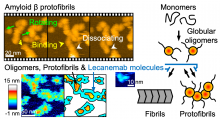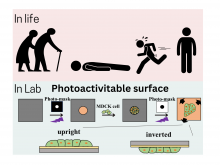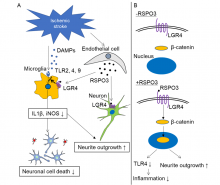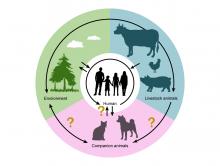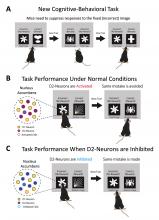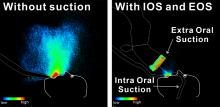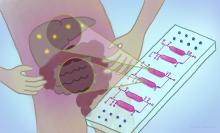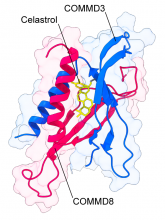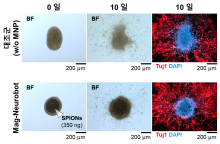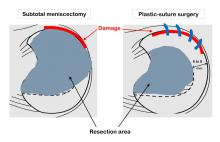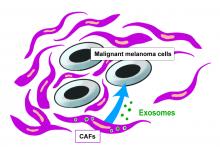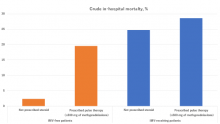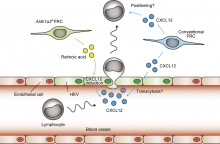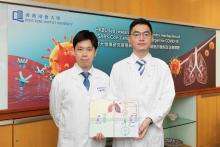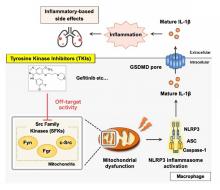Medicine & Healthcare
News
15 May 2023
Researchers at Kanazawa University report in the Proceedings of the National Academy of Sciences of the United States of America (PNAS) high-speed atomic force microscopy experiments that show how ligands associated with stimulating and suppressing activation of the TRPV1 protein increase and decrease the molecule’s structural variations. The observations provide insights into how these heat- and chilli-sensing proteins function.
12 May 2023
Specially coated surfaces help scientists investigate what happens when cell clusters are turned upside down.
11 May 2023
Researchers from Osaka University identified a new protein, R-spondin 3 (RSPO3), that has beneficial effects after ischemic stroke in mice. Specifically, RSPO3 activates the protein LGR4 to trigger a cascade of cellular reactions that decreases inflammation and stimulates the growth of neuronal extensions. Moreover, administrating RSPO3 to mice one day after stroke improved recovery of sensory and motor functions. These findings provide a new target for developing treatments to improve recovery after ischemic stroke.
10 May 2023
A new drug delivery system delivers an antioxidant directly to mitochondria in the liver, mitigating the effects of oxidative stress.
08 May 2023
Osaka Metropolitan University scientists investigated the prevalence of antimicrobial resistant bacteria in 678 bacterial isolates from 428 companion dogs and 74 companion cats at the Veterinary Medical Center, Osaka Metropolitan University. Two E. coli strains have both a mobile colistin-resistant mcr gene and a third-generation cephalosporin-resistant blaCTX gene. One of these strains, which is found in a dog, was resistant to both colistin and third-generation cephalosporins.
04 May 2023
HKBU joint research suggests that urine cytomegalovirus test facilitates early prediction of AIDS end-organ diseases
28 Apr 2023
Polycyclic aromatic hydrocarbons, in particular, lower the prognosis of ischemic strokes by causing inflammation in the brain.
26 Apr 2023
Singapore scientists find use of healthcare resources, absenteeism and reduced productivity due to mental health issues place a significant burden on Singapore’s economy.
25 Apr 2023
A research group at the Osaka Metropolitan University analyzed the relationship between diet, muscle mass, and liver fibrosis progression in 136 patients with nonalcoholic fatty liver disease attending the Osaka Metropolitan University Hospital. The research group found that the group with the highest Japanese diet score had less advanced liver fibrosis, and that the intake of soy products, seafood, and seaweed was important.
25 Apr 2023
The Nobel prize winning physicist Niels Bohr once said, “An expert is a (person) that has made all the mistakes that can be made in a narrow field.” This idea that to master a skill we must learn from our mistakes and avoid making them in future has long been recognized; however, the brain mechanisms and pathways that control this ability have been poorly understood.
We revealed a specific brain pathway that allows us to identify and learn from our mistakes to guide better decision-making in future.
Our work is an important step towards understanding how the brain controls our daily choices and behavior. The identification of these cells as ‘mistake signalers’ may also help to guide new treatments for mental health conditions associated with impaired decision-making ability.
17 Apr 2023
Asia Research Newsは同所の女性研究者5名に、彼女らの研究について、そしてなぜKavli IPMUを選んだのか、これまでの同所での経験について話しを聞いた。それぞれ様々な背景を持ち、各分野で卓越している研究者らに、足かせのない女性がいかに飛躍できるかをみせてもらった。
14 Apr 2023
Research reveals a promising stem cell approach to correct photoreceptor cell degeneration, which underlies several forms of visual decline and blindness.
10 Apr 2023
Doctors at King Chulalongkorn Memorial Hospital have developed lightweight and easy-to-use Parkinson's gloves that can automatically reduce tremors, allowing patients to enjoy social life and reducing side effects from medication and risk from brain surgery.
10 Apr 2023
The COVID-19 pandemic has made us more aware of the aerosols that hang around in the air and spread certain infectious diseases. Common dental procedures can be potentially hazardous in this regard. Therefore, it is crucial for researchers to be able to measure how aerosols spread so they can reduce them. A recent study harnessed a high-sensitivity camera and a high intensity LED light source, along with a mannequin and dental air turbine, to measure the spread of aerosols and the effectiveness of various means to reduce them.
07 Apr 2023
A tiny platform empowers scientists to examine how gut and liver cells interact in health and disease.
05 Apr 2023
Researchers from Osaka University found that the COMMD3/8 complex is implicated in the progression of the autoimmune response in a mouse model of rheumatoid arthritis. They identified celastrol, the active compound of a medicinal herb, as an inhibitor of the COMMD3/8 complex. Celastrol blocked the progression of rheumatoid arthritis. Thus, celastrol is a potential lead for developing treatments against rheumatoid arthritis.
31 Mar 2023
- Research teams led by Professor Hongsoo Choi and Professor Yongseok Oh from DGIST joined the research team led by Dr. Jongcheol Rah from Korea Brain Research Institute to develop the technology for delivering a microrobot to a target point of a hippocampus in an in-vitro environment, connecting neural networks, and measuring neural signals
- The research findings are expected to contribute to neural network research and the verification and analysis of cell therapy products
28 Mar 2023
Researchers from Osaka Metropolitan University Graduate School of Medicine conducted an interoperative comparison of lateral disc meniscus injuries of young patients (aged 15 or less), that were treated with plastic sutures or subtotal resection, to see if there was a difference in postoperative cartilage degeneration. The research group observed that sub-total meniscectomies were more likely to show cartilage degeneration, being worst in lateral disc meniscus injuries. In addition, they found that even with higher levels of meniscus damage, preserving the meniscus with sutures was more effective in protecting the cartilage in young patients.
28 Mar 2023
· Duke-NUS sleep scientists’ analyses show associations between early classes, less sleep, poor attendance and reduced grade point average.
· Studies in secondary and junior college students have shown that later start times can have positive impacts on grades.
27 Mar 2023
Cancer-associated fibroblasts (CAFs) are key factors in the tumor microenvironment, which have been implicated in cancer cell progression. It has also been reported that vesicles called exosomes produced by these CAFs play an important role in cancer progression. An Osaka Metropolitan University research group investigated the effect of CAF-derived exosomes on the growth of malignant melanoma cells. They found that CAF-derived exosomes express CD9 and CD63 transmembrane proteins, and that the CD9-positive exosomes may inhibit the growth of malignant melanoma cells.
27 Mar 2023
Researchers from Osaka University have found that repeated high-dose treatment, known as pulse therapy, with the steroid methylprednisolone reduces in-hospital deaths in COVID-19 patients who receive invasive mechanical ventilation, but not in patients who don’t receive invasive mechanical ventilation. These findings were only possible using appropriate statistical methods to remove bias from the data, which originally seemed to show that the opposite was true. These results can improve patient treatment and reduce COVID-19-related deaths worldwide.
23 Mar 2023
A research group from Osaka Metropolitan University investigated the relationship between tobacco use, including heated tobacco products, with the risk of SARS-CoV-2 infection and severe COVID-19. The researchers administered an online survey of living conditions in February 2022 to 30,130 participants aged 16-81 years, finding that heated tobacco product users had significantly higher rates of SARS-CoV-2 infection compared to non-tobacco users. Furthermore, the research group found that among all tobacco users, those who used both heated tobacco products and traditional cigarettes had the highest incidence of requiring hospitalization or oxygen due to COVID-19.
23 Mar 2023
Researchers from Osaka University identified a subset of fibroblastic reticular cells (FRCs) that simultaneously express two proteins, Aldh1a2 and Tie2, making them unique to areas of the omentum called milky spots. Genetic depletion of these cells caused structural disruption of milky spots. The FRCs were critical to the abdominal immune system as they regulated CXCL12 levels, a molecule necessary for lymphocyte recruitment from blood circulation. These insights can help develop novel treatments for intra-abdominal infections.
21 Mar 2023
Consumer choices in an experimental online grocery store indicate the likely impact of a new labelling system in Singapore.
20 Mar 2023
A study led by scientists from Hong Kong Baptist University (HKBU) has identified a protease called MT1-MMP that is a major host factor behind the infectivity of the SARS-CoV-2 virus in the human body, which leads to the infection of COVID-19 and multi-organ failure. By applying a humanised antibody called 3A2 that can inhibit the activity of MT1-MMP, the viral load of infected mice was reduced by almost 90%. The research team also demonstrated that the protease is a potential therapeutic target for COVID-19.
18 Mar 2023
Scientists restore impaired kidney for the first time, How fibre composite fails when wet, Cleaner fish recognize themselves in pictures 🖼️🐟& The source of black carbon in the sea. Read all in the latest Editor's Choice. Plus our magazine Asia Research News 2023 is out now 🎉!
17 Mar 2023
Tyrosine kinase inhibitors (TKI) are employed to attack specific types of cancer cells. The downside to using TKs is that they can cause serious inflammation. A team of researchers has discovered the underlying mechanism that causes this inflammation.
16 Mar 2023
PAXLOVID™ rollout continues with Laos, Malawi, Rwanda and Zambia as international access to oral treatments improves.
16 Mar 2023
Annual innovation event brings together global innovators, entrepreneurs, researchers and scientists, and experts from various fields and industries to showcase their latest innovations, share ideas, and collaborate with industries to develop better technologies and solutions to shape our future. This is also a platform for innovators to meet potential investors and partners.
Events
Sorry, nothing coming up for this discipline
- « first
- ‹ previous
- 1
- 2
- 3
Researchers
Sorry, nothing coming up for this discipline
- « first
- ‹ previous
- 1
- 2
- 3
Giants in history
Sorry, nothing coming up for this discipline


